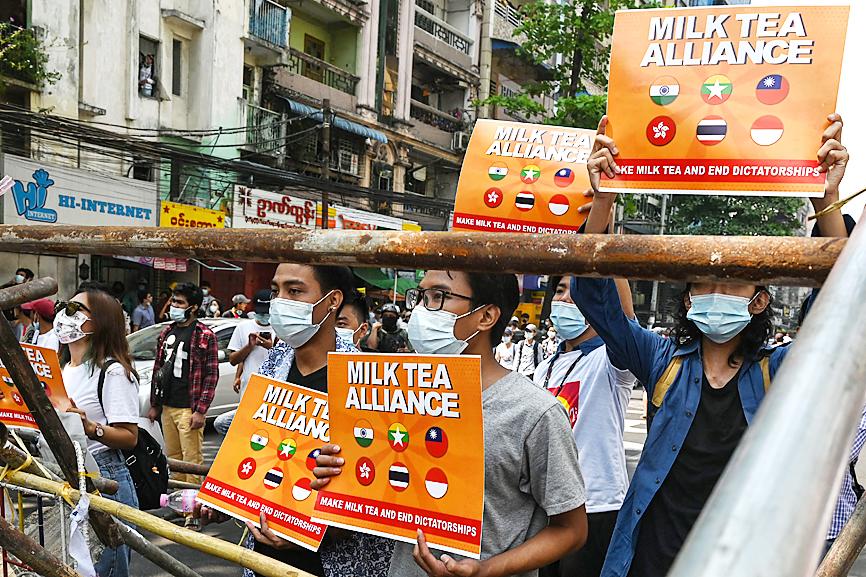Twitter has thrown its support behind the “Milk Tea Alliance” of democracy movements in Taiwan, Hong Kong and elsewhere in Asia, defying China at a time when Beijing is punishing Western companies for commenting on what it considers internal matters.
The social media company yesterday prominently displayed flags of Taiwan, Hong Kong, Myanmar and Thailand while unveiling an emoji to support democracy advocates in places that have in the past few years seen historic protests and share a love for the beverage.
The emoji will automatically show up when users post the #MilkTeaAlliance hashtag, which was posted been 11 million times since last year, Twitter said.

Photo: AFP
Although the company gets the majority of its revenue from the US, and is banned in China along with Facebook and Google, Asia is considered a growth area by the company.
US Internet giants earn advertising revenue through Chinese companies and organizations keen to reach global audiences.
Chinese officials have also increasingly embraced Twitter to counter criticism on a range of topics from snuffing out Hong Kong’s democracy movement to allegations of forced labor in Xinjiang.
Twitter labels such accounts as government entities.
In January, it used its policy against dehumanization to lock the official account of the Chinese embassy in Washington after a post that defended the Chinese Communist Party’s policies in Xinjiang.
Last month, Beijing supported a boycott of clothing retailers amid rising criticism of its policies in the cotton-producing western Chinese region, where international observers have raised concerns about human rights abuses, including detention camps and forced labor.
Spokespeople for Twitter and the Hong Kong government did not immediately respond to requests for comment.
The “Milk Tea Alliance” is increasingly more than just a meme.
Young, digital-savvy democracy advocates across Asia have shared tactics for organizing and sustaining home-grown protest and democracy movements, while trying to ensure that demonstrators and organizers know how to avoid identification or arrest.
Following Hong Kong’s protracted unrest in 2019, several democracy advocates in the territory have voiced support for other democracy movements: First Thai protesters challenging the country’s monarchy and then Burmese demonstrators following a Feb. 1 coup.
Hong Kong democracy advocate Joshua Wong (黃之鋒), who is in jail and faces multiple charges, has said that the alliance is not just about anger over China’s policies toward Taiwan, Hong Kong and Xinjiang, but also about China’s growing influence throughout Asia.
Twitter yesterday also voiced opposition to governments censoring the Internet or suppressing access to wireless networks, a tactic deployed by Myanmar’s military government.
“From #MeToo, #BlackLivesMatter to #MilkTeaAlliance, Twitter continues to play a unique role in enabling the public conversation around important social movements that are happening around the world,” the company said. “During times of civil unrests or violent crackdowns, it is more important than ever for the public to have access to the #OpenInternet for real-time updates, credible information, and essential services. #KeepitOn.”

Trips for more than 100,000 international and domestic air travelers could be disrupted as China launches a military exercise around Taiwan today, Taiwan’s Civil Aviation Administration (CAA) said yesterday. The exercise could affect nearly 900 flights scheduled to enter the Taipei Flight Information Region (FIR) during the exercise window, it added. A notice issued by the Chinese Civil Aviation Administration showed there would be seven temporary zones around the Taiwan Strait which would be used for live-fire exercises, lasting from 8am to 6pm today. All aircraft are prohibited from entering during exercise, it says. Taipei FIR has 14 international air routes and

Taiwan lacks effective and cost-efficient armaments to intercept rockets, making the planned “T-Dome” interception system necessary, two experts said on Tuesday. The concerns were raised after China’s military fired two waves of rockets during live-fire drills around Taiwan on Tuesday, part of two-day exercises code-named “Justice Mission 2025.” The first wave involved 17 rockets launched at 9am from Pingtan in China’s Fujian Province, according to Lieutenant General Hsieh Jih-sheng (謝日升) of the Office of the Deputy Chief of the General Staff for Intelligence at the Ministry of National Defense. Those rockets landed 70 nautical miles (129.6km) northeast of Keelung without flying over Taiwan,

City buses in Taipei and New Taipei City, as well as the Taipei MRT, would on Saturday begin accepting QR code payments from five electronic payment providers, the Taipei Department of Transportation said yesterday. The new option would allow passengers to use the “transportation QR code” feature from EasyWallet, iPass Money, iCash Pay, Jkopay or PXPay Plus. Passengers should open their preferred electronic payment app, select the “transportation code” — not the regular payment code — unlock it, and scan the code at ticket readers or gates, General Planning Division Director-General Liu Kuo-chu (劉國著) said. People should move through the

The Ministry of National Defense (MND) today released images of the military tracking China’s People's Liberation Army (PLA) movements during the latest round of Chinese drills around Taiwan. The PLA began "Justice Mission 2025" drills today, carrying out live-fire drills, simulated strikes on land and maritime targets, and exercises to blockade the nation's main ports. The exercises are to continue tomorrow, with the PLA announcing sea and air space restrictions for five zones around Taiwan for 10 hours starting from 8:30am. The ministry today released images showing a Chinese J-16 fighter jet tracked by a F-16V Block 20 jet and the